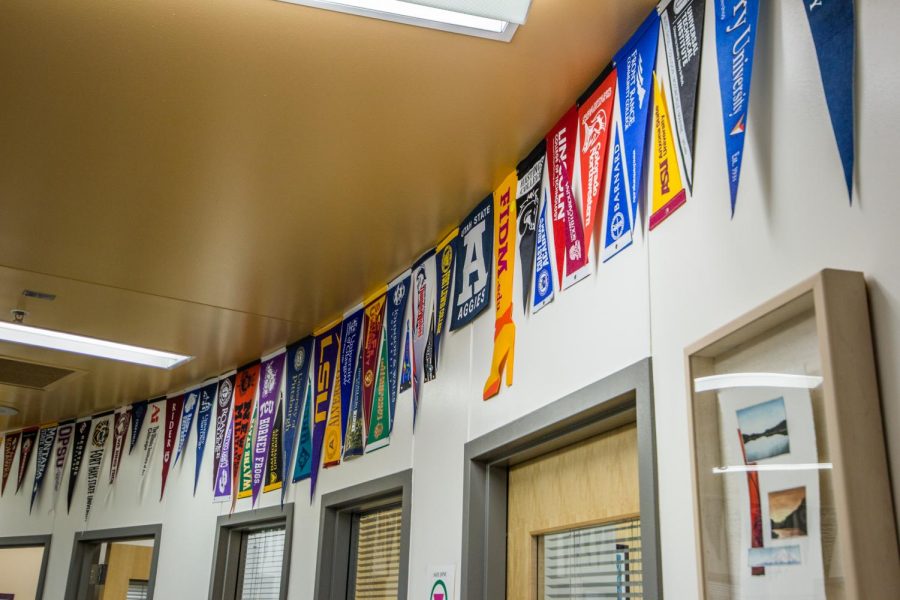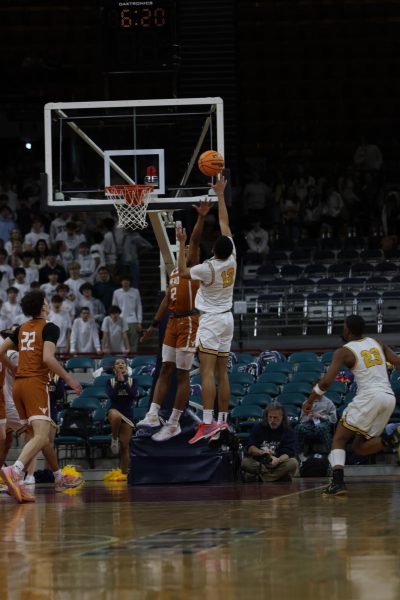Professors from different colleges share their grading policies
How do the grading policies of local and out of state colleges align with that of MHS?
A string of banners representing various colleges lines the counseling office.
December 16, 2017
The following is the 4th segment in a series meant to explore the 80/20 grading policy at Mead High School. Stay tuned for more installments.
If you have not yet read the first segment describing why MHS has the 80/20 policy, according to Principal Ayers, you can read that here.
If you have not yet read the second segment describing student reactions to the MHS policy, you can access that here.
Thirdly, if you have not yet read about teacher responses to the grading policy, please read it here.
Since the school opened 9 years ago, there had been no formal grading policy — that is, until 2015 when the 80/20 policy was put in place.
The policy is as follows: Learning activities are 20 percent of a student’s final grade (formative assessments), while assessments (summative assessments) are mostly exams, tests, and quizzes, which result in 80 percent of the student’s grade. Ayers has described formative assessment as the following: “[it] should inform and move students from introduction to proficiencies so that [students] are becoming proficient on assessments.”
In support of the 80/20 policy, Ayers has stated that “game day” (referring figuratively to assessment) is what is truly important. “You have your practice days and then performance days and no one really cares about the practice stage; what do they care about? The performance. That speaks really loud about what you do and don’t know.”
She wants students to be prepared for college. “If you fail college assessments, that is very costly.”
Ayers explains that college preparation means making sure students are ready to take college-level exams. In the past, she believed that grades did not necessarily reflect what students knew and were able to do. Her hopes have been that the 80/20 policy would be a more accurate reflection of students’ knowledge.
Ryan McLane, a contributor to Education Week, explains the issues regarding how a student’s grade reflects, or does not reflect their knowledge:
The question is…what actually went into that B? Unfortunately, a teacher’s grade book is one of life’s greatest mysteries. Did Johnny do well on tests, but fail to turn in some homework assignments, thus dropping him to a B? Possibly worse, did he do poorly on his tests, but those deficiencies were masked by Johnny’s reliable turning-in of homework or participation in class? Perhaps worse yet, did Johnny’s grade increase because he brought in a box of tissues or earned some other type of extra credit? I firmly believe the problems of the American education system are not the result of years of poor teaching practices. They are the result of years of poor grading practices.
Though strengthening the reliability of a teacher’s grading system is considered a valid reason for 80/20, the most commonly heard reason is that it prepares students for college.
Some professors do grade based entirely on assessment.
Dr. Poet, a math professor at Missouri Western, wrote the following in email correspondence:
100% of my grades are based on assessments. If you consider homework assignments and quizzes as assessments, (which I do … I grade them and assign a score to each problem, an overall score to each assignment/quiz, and an overall score out of 100 points for that portion of their overall course grade) then I guess my math course (again, a very typical course to be taken by a first-semester freshman at my institution) is entirely based on assessment. I give absolutely zero credit for attendance or a pretty smile. I do, however, have a line in my syllabus (the document that gives the rules and expectations for the course and is handed out on the first day as a sort of contract) that says if you miss 6 or more classes in the semester, you may receive an F in the course.
Others choose to weigh different categories. For instance, Dr. Cindy O’Donnell-Allen, an English professor from CSU, says this is how she grades one of her upper-level English classes:
“Class Participation: 10%
Four short “Language Application” papers: 27%
Interactive Notebook (which has multiple entries): 20%
A major course project…: 33%
Roundtable presentation: 10%”
Kent Willmann, a History professor from CU, appears flat-out against grading the way it is done across schools in the United States. In an interview, he referred to an educational researcher, Paul Dressel, who once said, “A grade is an inadequate report of an inaccurate judgment by a biased and variable judge of the extent to which a student has attained an undefined level of mastery of an unknown proportion of an indefinite amount of material.” Willmann added, “But we still have to give them.”
Similarly, Jill Adams, an English professor at Metro State University of Denver, states, “It is not easy to create a well-crafted, effective assessment. Most of the exams I have seen do not adequately assessment course or unit objectives”
Ayers has shared that 80/20 is designed to prepare students for college. Jenny LaVanchy, a Language professor at the University of Wyoming, explains, in her opinion, why this is not fair.
“Tests and quizzes were never worth more than 40%, simply because our outcome goals are different. I want to assess speaking ability, emphasize everyday practice, and do a number of writing assignments. Even in higher level language classes, tests are usually never weighed so heavily. You are expected to write papers and present, or you have multiple projects.
Personally, I think it is unfair and unrealistic to assess only on tests. Most of our job performance is based on multiple tasks and interactions, so just relying on testing isn’t an accurate reflection of the real world. It’s just that it is the easier, faster option in most cases”
Furthermore, grading policies are not uniform at most of the colleges who responded to requests for interviews, except CU whose policy is up to interpretation, according to Willmann. “But as you can imagine there is much variation in how it works in each professor’s class.”
Most professors, regardless of grading policy, find value in student participation, but some professors will grade based on that as well. Dr. Adams, from MSU Denver, explains that she “give[s] points for process and daily learning because [she] believe[s] these steps along the way are critical keys to success in bigger writing assignments and projects.”
She continues with “I do not give tests in my college classes, for I have found that writing assignments and course projects allow my students to demonstrate learning and understanding better than a test. The field of English Language Arts is all about skills and big ideas that are transferable. I believe that other methods of assessment are better tools to gauge student learning.”












